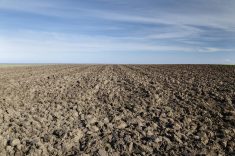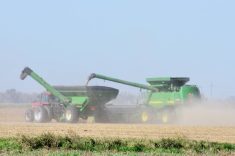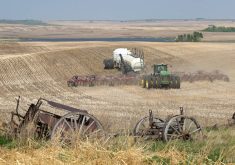Manitoba should lift its recently introduced winter fertilizer application ban to allow for more flexibility with changing weather and corresponding soil temperatures, say members of the Keystone Agricultural Producers.
The year-old nutrient management regulation prohibits application of nitrogen and phosphorus between Nov. 10 and April 10, and that means farmers may not be able to fertilize during best conditions, said farmers at KAP’s annual meeting last week.
Allowing exemptions based on weather and soil conditions makes more sense than set-in-stone fixed dates, said Eric Dyck, who farms near Springstein.
Read Also

Precision 4R cuts farm greenhouse gas emissions
Lower areas in your field tend to emit more greenhouse gas, research shows that precision 4R nutrient stewardship practices can help mute the trend
“We feel that the restriction dates could push farmers to apply fertilizers at times that could mean more losses to volatilization,” Dyck said.
“An application process to allow exemptions to these restrictions, based on good agronomic practices, as well as taking into consideration environmental factors, would allow farmers to fertilize at ideal times for optimum production.”
Windows of opportunity sometimes open during the winter or early spring, and farmers growing forages, forage seed, or winter wheat can suffer yield losses if they miss them, he added.
A permit process, similar to the approach taken for stubble burning, would be more sensible, other delegates argued.
“There’s no process in place and that’s what we’d like,” said Cal Penner, a District 3 KAP member. “Right now it’s a subjective decision.”
KAP delegates are also concerned about the looming ban on using coal to heat farm buildings.
The province will ban coal usage in 2014 and just this month introduced a coal tax to generate an incentive fund to help farmers switch to biomass fuels.
Farmers say it will take a lot longer than two years for the province’s biomass production and distribution industry to produce sufficient quantities of alternatives such as biomass pellets and cubes. It will also take longer to put in place the required infrastructure. Natural gas is also not available in many areas of the province.
“I don’t see us switching in just two years,” said Fisher Branch-area producer Paul Gregory.
Landowner protection
Other resolutions passed at the Jan. 25 meeting included calls for Manitoba Hydro to include in the compensation package the cost of liability insurance so that any mishaps around towers don’t end up costing farmers higher premiums.
KAP is also calling for legislation that would protect farmers and other landowners from potential financial losses such as decreased land values due to public work projects, and for updates to the provincial Oil and Gas Act that would require well site locations be determined before surface rights being granted.
KAP will also continue to push for improved telecommunications in rural Manitoba, citing a lack of affordable rural Internet service as well as cellphone service, saying that puts farmers without access to either at a competitive disadvantage. KAP passed a similar resolution during their July meeting.



















